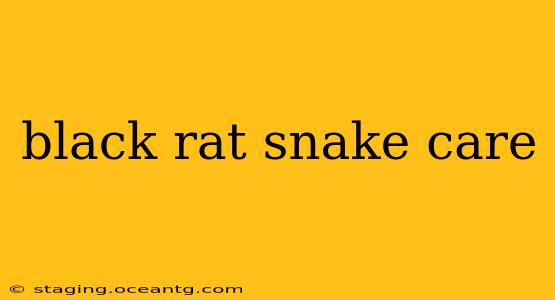The black rat snake ( Pantherophis obsoletus ), a captivating and intelligent snake, is a popular choice for reptile enthusiasts. Their docile nature, relatively large size, and ease of care make them ideal for intermediate keepers. However, providing proper care is crucial for their health and longevity. This comprehensive guide will cover everything you need to know about black rat snake care, addressing common questions and concerns.
What do black rat snakes eat?
Black rat snakes are constrictors, meaning they subdue their prey by squeezing it until it suffocates. In the wild, their diet primarily consists of rodents (mice, rats, voles), but they may also consume birds and other small mammals. In captivity, they should be fed appropriately sized rodents, starting with appropriately-sized pinky mice for young snakes, gradually increasing the size of prey as they grow. The frequency of feeding depends on the snake's age and size; younger snakes will need to eat more frequently than adults. It's vital to always offer appropriately sized prey to avoid impaction.
How big do black rat snakes get?
Black rat snakes are among the largest North American rat snakes, reaching lengths of 4-6 feet, with some exceptionally large individuals reaching over 7 feet. Females are generally larger than males. Understanding their potential size is essential for providing adequate housing.
How long do black rat snakes live?
With proper care, black rat snakes can live for 15-20 years or even longer in captivity. Providing a suitable environment, a balanced diet, and regular veterinary checkups contributes significantly to their lifespan.
What size enclosure do black rat snakes need?
The size of the enclosure depends on the snake's age and size. A young snake might be housed in a 20-gallon long tank, but as they grow, they'll need significantly more space. An adult black rat snake needs at least a 4x2x2 foot enclosure or even larger, depending on the snake's size. Proper ventilation is essential; ensure the enclosure has sufficient air circulation to prevent respiratory problems.
What kind of substrate should I use for my black rat snake?
Several substrates are suitable for black rat snakes, including aspen shavings, cypress mulch, or reptile carpet. Avoid substrates that retain excessive moisture, as this can lead to fungal or bacterial infections. The substrate should be easy to clean and maintain.
What temperature and humidity do black rat snakes need?
Black rat snakes require a thermal gradient in their enclosure. A basking spot should be maintained at 88-92°F (31-33°C), while the cooler side of the enclosure should be around 75-80°F (24-27°C). Humidity should be maintained at 40-60%. You can use a thermometer and hygrometer to monitor the temperature and humidity levels. Providing a water dish is also essential for hydration.
How often should I handle my black rat snake?
While black rat snakes are generally docile, they are still wild animals and should be handled with respect. Start with short handling sessions when the snake is young and gradually increase the duration as it becomes accustomed to your presence. Avoid handling immediately after feeding.
Are black rat snakes venomous?
No, black rat snakes are not venomous. They are constrictors, meaning they kill their prey by constriction. They pose no venomous threat to humans.
How often should I clean my black rat snake's enclosure?
Spot clean the enclosure daily, removing any uneaten food and fecal matter. A complete enclosure cleaning should be performed at least once a month, or more frequently if needed. This involves removing all substrate, cleaning the enclosure thoroughly with a reptile-safe disinfectant, replacing the substrate, and rearranging the enclosure elements.
What are some common health problems in black rat snakes?
Common health problems in black rat snakes can include parasites, respiratory infections, and dysecdysis (difficulty shedding). Regular veterinary checkups are crucial for early detection and treatment of any health issues.
This comprehensive guide provides a solid foundation for caring for a black rat snake. Remember, consistent research, careful observation, and a proactive approach to husbandry are essential for ensuring the health and well-being of your reptile companion. Enjoy the rewarding experience of keeping these fascinating creatures!
